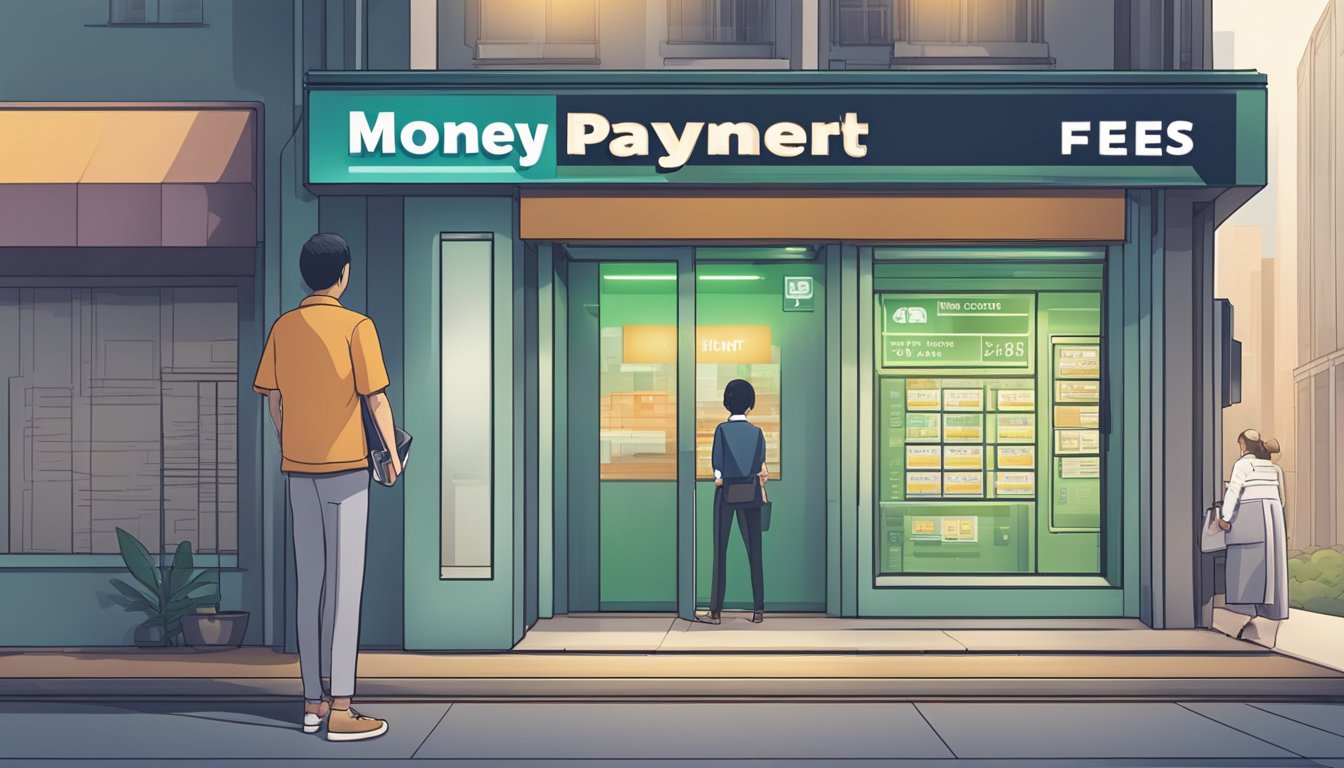Are you struggling to make your licensed money lender payments on time in Singapore? Late payments can be a stressful and costly experience, but there are ways to manage the situation and avoid additional charges. This article will explore the consequences of late payments when borrowing from a licensed money lender in Singapore and offer tips to help you avoid late payment fees.

When you borrow money from a licensed money lender in Singapore, it’s essential to understand the terms and conditions of your loan agreement. Late payments can result in additional fees, such as late payment charges and interest on the overdue amount. These fees can quickly add up, making it even more challenging to repay your loan. Therefore, making your payments on time is crucial to avoid these extra charges.
If you’re struggling to make your payments on time, don’t panic. You can take steps to manage the situation and avoid additional fees. By communicating with your licensed money lender and exploring your options, you can find a solution that works for you. So, let’s dive into the details and learn how to manage late payments when borrowing from a licensed money lender in Singapore.
1 Minute Read: What Happens If You’re Late Paying a Licensed Money Lender?
Hey there, borrowers! If you’re looking for a quick rundown on “Licensed Money Lender Late Payment: What You Need to Know!” you’re in the right place. Let’s get straight to the point with some essential info about dealing with licensed money lenders in Singapore.
The Basics:
- Late Payments Explained: When you borrow money from a licensed lender, it’s a serious deal. If you miss your payment deadlines, it can lead to trouble. Late fees and damage to your credit score are just some consequences you might face.
- Late Fees: Be aware that most licensed money lenders will charge you extra if you’re late with your payments. These fees can vary, so read the small print in your loan agreement.
- Credit Score Crunch: Missing payments can harm your credit score. This makes it harder to borrow money in the future. So, it’s vital to keep up with your repayments to keep your credit record healthy.
- Talk it Out: Don’t be afraid to talk to your lender if you struggle to pay. Many lenders are willing to help if you’re upfront about your situation. Being honest and open can prevent a small problem from becoming big.
- Legal Troubles: Ignoring late payments can lead to legal action from your lender. Take it seriously and deal with it promptly to avoid getting into hot water.
Being informed and proactive is the key to staying out of financial trouble. Keep learning and managing your money wisely below!
Licensed Money Lender Late Payment: Understanding LMLs in Singapore

If you need a loan, it’s essential to understand the difference between licensed and unlicensed moneylenders. In Singapore, licensed moneylenders are regulated by the Ministry of Law and are required to follow strict guidelines to ensure fair lending practices.
Distinction Between Licensed and Unlicensed Moneylenders
Unlicensed moneylenders are often referred to as “loan sharks” and are known for their predatory lending practices. They often charge exorbitant interest rates and may use aggressive tactics to collect payments, such as harassment or threats of violence. It’s important to avoid borrowing from unlicensed moneylenders as it can lead to serious financial problems and even legal issues.
On the other hand, licensed moneylenders are authorized by the Ministry of Law to provide loans to individuals and businesses. They are required to follow strict guidelines, such as limiting the amount of interest they can charge and providing clear and transparent loan terms. Borrowing from a licensed moneylender can be a safe and reliable way to obtain financing when you need it.
Regulatory Framework and the Ministry of Law
The Registry of Moneylenders is responsible for regulating licensed moneylenders in Singapore. They maintain a list of licensed moneylenders and provide information on the rules and regulations governing the industry. The Ministry of Law also plays a key role in regulating moneylenders and ensuring that borrowers are protected.
If you are considering borrowing from a licensed moneylender, it’s important to do your research and choose a reputable lender. Look for a lender that is transparent about their fees and interest rates, and make sure you understand the terms of the loan before signing any paperwork. By working with a licensed moneylender, you can get the financing you need without putting yourself at risk of financial harm.
Licensed Money Lender Late Payment: Late Payment Realities

If you are borrowing money from a licensed money lender in Singapore, it is important to understand the realities of late payment. Late payment can result in several consequences that can affect your financial situation.
Consequences of Late Payment
When you fail to repay your loan on time, the licensed money lender can charge you a late fee. According to the Ministry of Law’s Moneylenders Act, the late payment fees are capped at S$60 per month. Additionally, the money lender can charge you late interest on the amount that is repaid late. The late interest can only be charged on an amount that is repaid late, not on amounts that are outstanding but not yet due to be repaid.
If you continue to miss payments, your debt can accumulate, making it harder for you to repay the loan. The licensed money lender may also take legal action against you, which can result in additional fees and charges. In some cases, your credit score may be affected, making it harder for you to borrow money in the future.
Calculating Late Interest Fees
Calculating late interest fees can be confusing, but it is important to understand how they are calculated. Late interest is charged on the amount that is repaid late, not on the total outstanding amount. For example, if you borrowed S$10,000 and failed to pay the first instalment of S$2,000, the licensed money lender can only charge late interest on the S$2,000 that is repaid late, not on the remaining S$8,000.
The late interest rate is usually higher than the interest rate for the loan itself. According to the Ministry of Law’s Moneylenders Act, the late interest rate cannot exceed 4% per month. It is important to keep track of your payments and make sure that you repay the loan on time to avoid late interest fees.
In conclusion, late payment can have serious consequences when borrowing from a licensed money lender in Singapore. Make sure you understand the late payment fees and late interest rates, and do your best to repay the loan on time to avoid additional charges and legal action.
Licensed Money Lender Late Payment: Loan Agreements and Terms

When you take out a loan from a licensed money lender in Singapore, you will be required to sign a loan agreement that outlines the terms and conditions of the loan. It is important to carefully read and understand the loan contract before signing it. This section will cover the essential components of loan contracts and the transparency and fees disclosure required by law.
Essential Components of Loan Contracts
Loan contracts are legal documents that outline the terms and conditions of a loan. They typically include important details such as the loan amount, interest rate, repayment schedule, and any fees or charges associated with the loan. The loan contract will also include information about what happens if you fail to make your payments on time.
Under Singapore law, licensed money lenders are required to provide borrowers with a note of contract that outlines the terms and conditions of the loan. This note of contract must be in a language that the borrower understands, and it must be signed by both the borrower and the money lender.
Transparency and Fees Disclosure
Transparency is a key component of responsible lending. Licensed money lenders are required to disclose all fees and charges associated with the loan upfront. This includes loan approval fees, late payment fees, and legal costs incurred by the money lender for successful recovery of the loan.
The loan approval fee is limited to 10% of the principal amount of the loan. Late payment fees are limited to $60 per month, and legal costs are only allowed if the money lender successfully recovers the loan.
In addition to these fees, the loan contract will also include information about the interest rate charged on the loan and the repayment schedule. It is important to carefully review this information and make sure that you understand the terms of the loan before signing the contract.
By law, licensed money lenders are required to provide borrowers with a clear and concise explanation of the terms and conditions of the loan, including all fees and charges. This helps to ensure that borrowers are able to make informed decisions about their borrowing options.
Overall, understanding the terms and conditions of a loan contract is essential for responsible borrowing. By carefully reviewing the loan contract and asking questions about any terms or fees that you do not understand, you can make sure that you are making an informed decision about your borrowing options.
Licensed Money Lender Late Payment: Dealing With Late Payments

Late payments can be a stressful and worrisome experience for borrowers in Singapore. However, there are strategies you can use to manage and overcome late payments. This section will provide you with some tips to help you deal with late payments.
Strategies for Borrowers
If you find yourself struggling to make your loan payments on time, there are several strategies you can use to help you catch up:
- Create a budget: Make a budget to help you manage your finances and track your expenses. This will help you identify areas where you can cut back on spending and free up some money to put towards your loan payments.
- Prioritize your payments: Make your loan payments a priority and try to pay them off before other bills. If you have multiple loans, focus on paying off the one with the highest interest rate first.
- Negotiate with your moneylender: If you are having trouble making your payments, talk to your moneylender about your situation. They may be able to offer you a flexible repayment schedule or waive some of the payment fees.
Negotiating with Your Moneylender
Negotiating with your moneylender can be a great way to manage late payments. Here are some tips to help you negotiate:
- Be honest: Be honest with your moneylender about your situation. Explain why you are having trouble making your payments and what you are doing to try and catch up.
- Propose a plan: Come up with a plan to catch up on your payments and propose it to your moneylender. This could include a flexible repayment schedule or a payment plan that works better for your budget.
- Ask for help: If you are struggling to come up with a plan, ask your moneylender for help. They may be able to offer you advice or refer you to a credit counselling service.
Late payments can be stressful, but they don’t have to be overwhelming. By creating a budget, prioritizing your payments, and negotiating with your moneylender, you can manage your late payments and get back on track with your loan.
Tip: Loan Consolidation
Consolidating your loans can streamline your payments, potentially lowering interest rates and simplifying your financial obligations. Additionally, keep an eye out for government initiatives or special loan programs tailored to borrowers facing difficulties – these could offer relief or assistance tailored to your situation.
Remember, proactive communication with your lender is critical; don’t hesitate to reach out and discuss your options, as they may have solutions you hadn’t considered.
Licensed Money Lender Late Payment: Legal Implications and Consumer Rights

Late payment of loans from licensed moneylenders can have legal implications and affect consumer rights. Understanding the legal costs and proceedings can help you make informed decisions and protect your interests as a borrower.
Understanding Legal Costs and Proceedings
When you borrow from a licensed moneylender in Singapore, you must pay interest and other fees as agreed upon in the loan contract. Late payment fees and interest charges may also apply if you fail to make timely payments.
The maximum late payment fee that a licensed moneylender can charge is $60 per month, and the total charges imposed on any personal loan cannot exceed an amount equivalent to the principal amount of the loan.
If you default on your loan, the licensed moneylender may take legal action against you to recover the outstanding debt. This may involve filing a claim in court, obtaining a judgment against you, and enforcing the judgment through various means, such as garnishing your wages or seizing your assets.
Protection Under Singaporean Law
As a borrower, you have certain rights and protections under Singaporean law. The Moneylenders Act and Rules provide safeguards to prevent unscrupulous lending practices and protect borrowers from harassment and abuse by loan sharks.
Licensed moneylenders must comply with the Moneylenders Act and Rules provisions, including limits on interest rates and fees, disclosure requirements, and fair collection practices. They are also required to provide you with a copy of the loan contract, which must be in a language that you understand.
If you believe a licensed moneylender has violated your rights or engaged in unfair practices, you can file a complaint with the Registry of Moneylenders. The Registry can investigate complaints and take enforcement action against licensed moneylenders who violate the law.
In conclusion, it is vital to be aware of your legal rights and obligations as a borrower from licensed moneylenders in Singapore. Late payment of loans can have serious legal and financial implications, so making timely payments and communicating with your moneylender if you are experiencing financial difficulties is essential.
Licensed Money Lender Late Payment: Additional Financial Considerations

Late payment fees and interest rates can quickly add up, leading to significant financial strain. As such, it’s important to understand the potential impact of late payments on your credit score and future borrowing opportunities.
Impact on Credit Score and Future Borrowing
Late payments can negatively impact your credit score, making it more difficult to secure loans or credit in the future. This is because credit bureaus take note of late payments and use this information to calculate your credit score. A lower credit score can result in higher interest rates and lower borrowing limits, making it more challenging to access financial assistance when you need it most.
Alternatives to Late Payment
If you are struggling to make your payments on time, it’s important to seek financial assistance as soon as possible. One option is debt consolidation, which involves combining multiple debts into a single loan with a lower interest rate. This can help reduce your monthly payments and make it easier to manage your finances.
Another option is to explore financial assistance schemes offered by the government or non-profit organisations. These schemes can provide financial support to those in need, helping to alleviate financial stress and prevent late payments.
In conclusion, late payments can have a significant impact on your financial wellbeing, from your credit score to your future borrowing opportunities. By exploring alternative options and seeking financial assistance when needed, you can better manage your finances and avoid the negative consequences of late payments.
Frequently Asked Questions
What are the repercussions of missing a payment with a licensed moneylender?
If you miss a payment with a licensed moneylender, you may be charged late payment fees and additional interest on the outstanding amount. The late payment fees are capped at $60 per month, and the interest can only be charged on the amount that is repaid late. The moneylender cannot charge interest on amounts that are outstanding but not yet due to be repaid. If you continue to miss payments, the moneylender may take legal action against you.
How much is typically charged for a late payment by a licensed moneylender?
Licensed moneylenders may charge up to $60 per month for late payment fees. However, the late payment fees cannot exceed the outstanding amount of the loan.
Can borrowing from a licensed moneylender impact my credit rating?
No, borrowing from a licensed moneylender does not impact your credit rating. However, if you fail to repay the loan, the moneylender may take legal action against you, which could negatively impact your credit rating.
What’s the maximum amount I can borrow from a licensed moneylender?
The maximum amount you can borrow from a licensed moneylender depends on your income and other factors. According to the Ministry of Law, if your annual income is less than $20,000, you can borrow up to $3,000. If your yearly income is $20,000 or more but less than $30,000, you can borrow up to $3,000. If your annual income is $30,000 or more, you can borrow up to six times your monthly income.
What measures does Singapore take against unauthorised moneylenders?
Singapore takes several measures against unauthorised moneylenders, including imposing heavy penalties and imprisonment for those caught engaging in illegal lending activities. The Ministry of Law also maintains a list of licensed moneylenders, which borrowers can check before taking out a loan.
What are the latest regulations affecting licensed moneylenders in Singapore?
The latest regulations affecting licensed moneylenders in Singapore include the introduction of a new interest rate cap of 4% per month for all loans and a new maximum loan amount of $3,000 for borrowers with an annual income of less than $20,000.
Additionally, licensed moneylenders must now provide borrowers with a statement of account for each loan, which must include details of all fees.
Wise Financial Management with Quick Credit Pte Ltd!
Late payments can be stressful, but there’s no need to worry! Quick Credit Pte Ltd is here to help you understand what to do if you’re facing late payments from licensed money lenders.
At Quick Credit Pte Ltd, we’re not just another lender – we’re your trusted financial partner, dedicated to providing the best personal loans and financial services designed just for you. We know late payments can be challenging. That’s why we’re here to make things easier.
So, if you’re feeling overwhelmed by late payments, don’t worry. Quick Credit Pte Ltd has your back.
